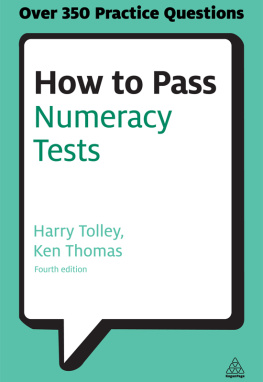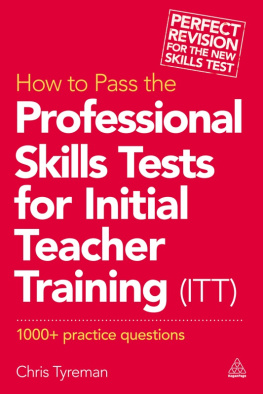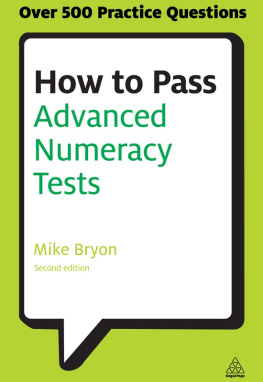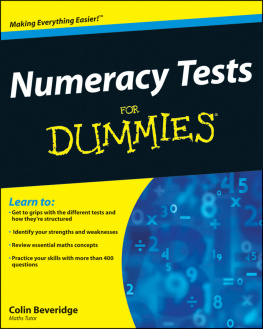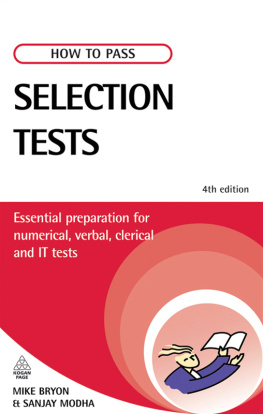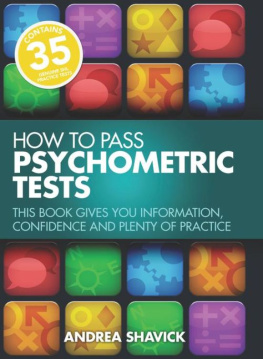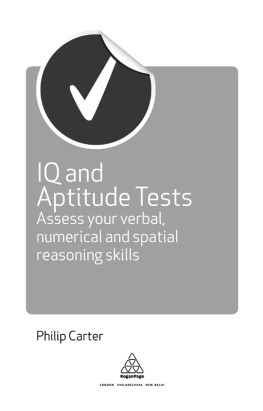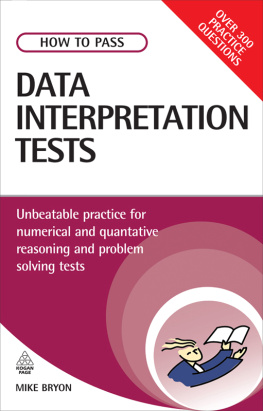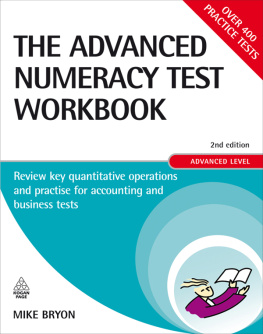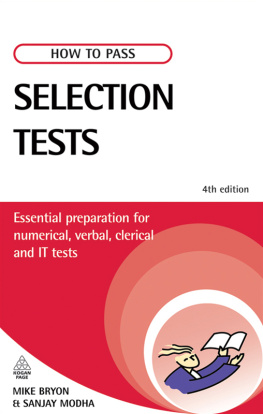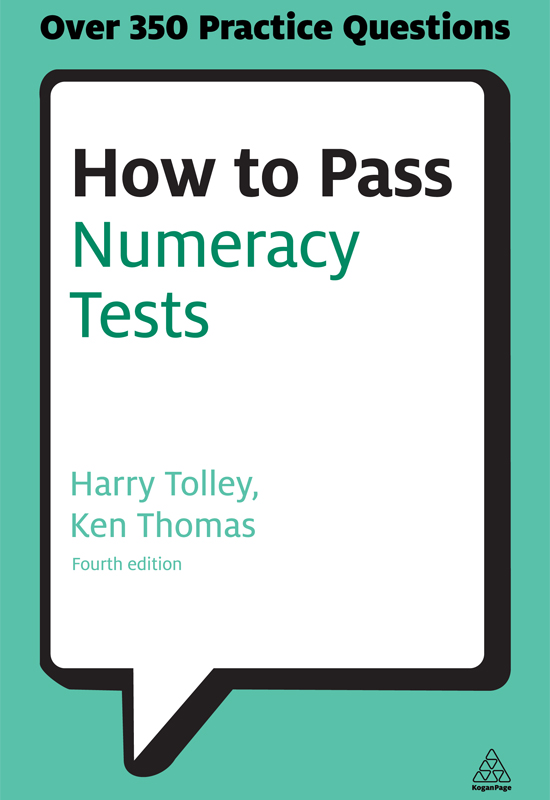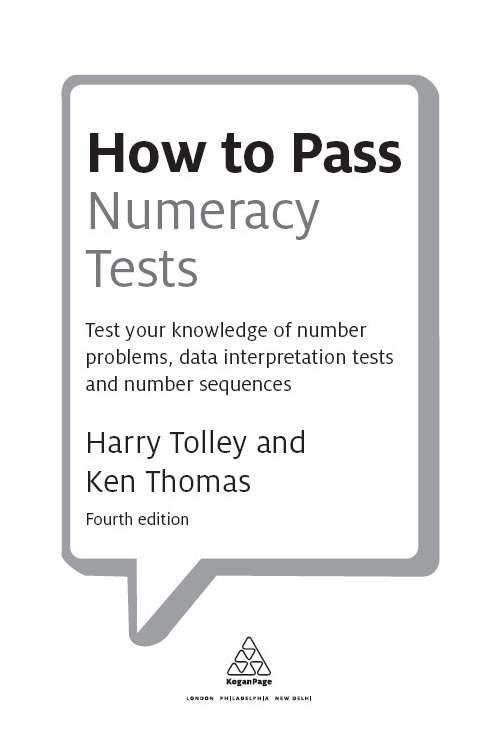Note on the Ebook Edition
For an optimal reading experience, please view largetables and figures in landscape mode. |
This ebook published in 2013 by Kogan Page Limited 120 Pentonville Road London N1 9JN UK www.koganpage.com Harry Tolley and Ken Thomas, 1996, 2000, 2006, 2010, 2013 E-ISBN 978 0 7494 6792 0 Contents A ssessment in its different forms is an inescapable part of everyday life. We have all been subjected to assessment of the most obvious and formal kind when we have taken an examination, been interviewed for a job or taken a driving test. We are also engaged in the process of assessment whenever judgements are made about us (or when we evaluate other people) on the basis of, for example, appearance, speech and behaviour. However, the results of these assessments become more significant for us when the results have a direct effect on our lives, ie when they are high stakes. This book is concerned with the testing of numeracy one of the abilities that organizations, including employers and educational institutions, frequently assess for purposes of selection.
For many people, selection tests present a serious obstacle to obtaining a place on a course, a job or, for those in employment, promotion to a more senior level. Many people fail to perform as well as they might on such tests because: they are over-anxious and nervous; they are out of practice with the techniques used when taking tests; they are unfamiliar with the ways in which test items or questions are posed and the methods by which they are expected to respond problems that may be exacerbated if they are required to take a test online, as is increasingly likely; through reliance on electronic calculators they may have become unaccustomed to doing even the most simple arithmetic calculations either in their heads or on paper. It is rare for candidates to be allowed to use calculators when taking selection tests. Consequently, your performance will be seriously impaired unless you have practised your basic number skills without the aid of a calculator, particularly under the time pressure you will be subjected to when taking a real test. Careful and systematic preparation for a selection test, including the use of the practice numeracy tests such as the ones provided here, can help you to overcome these common causes of failure. It will also help you to avoid the sense of frustration that comes from knowing that you have missed an opportunity because, when it mattered, you have not performed to the best of your ability.
The main purpose of this book, therefore, is to inform readers about selection tests in general and to offer guidance on how you might prepare yourself for taking them. However, a large proportion of its content consists of practice tests of the type known as numeracy or numerical reasoning tests. These are commonly used for selection purposes in order to establish how competent candidates are in their ability to work with numbers a basic requirement for many courses and jobs. By working systematically through the tests you will become more familiar with the techniques required to complete them successfully. Doing this will help you to build up your numeracy skills so that you will feel more confident when taking an actual selection test. You will find the answers to the practice tests in .
The practice tests in this book are similar to numeracy tests used widely for selection purposes. They have arisen from a wide range of training and development work undertaken by the authors with major employers such as Civil Service departments and agencies and the police. Many of the practice tests have been piloted by real candidates taking recruitment tests for entrance to the police service and to the Civil Service. Evaluation of the results of these pilot studies has demonstrated convincingly that regular use of these practice tests can significantly improve a candidates performance, particularly when resitting a test that he or she has previously failed. Experience also shows that doing well on a test is not only a matter of intelligence and aptitude, but also a matter of confidence and determination. If you lack confidence then you are unlikely to perform to the best of your ability on any test.
Our evaluation studies have shown that regular use of practice tests helps to boost the candidates confidence, and so enables them to cope more effectively with the nervousness and stress that everyone feels when taking an important assessment test or high stakes examinations. Use of the practice tests provided here, therefore, should help you to: become familiar with the different types of numerical reasoning tests that are commonly used for selection purposes; learn to work more effectively under the pressure of time experienced in real tests; improve your test techniques so that you do not lose marks through simple errors. The continuous feedback you will receive as you work through the tests should help to boost your self-confidence. This in turn should help to reduce your anxiety, nervousness and any tendency to panic when confronted with real selection tests. However, in order to succeed you will need to be well motivated, to take practice seriously and to work hard on any weaknesses that become apparent in your results. If you experience serious difficulty in coping with the practice tests given in the later chapters of this book it does not mean that you are a failure, and that you will never be able to succeed.
What the practice tests will have done is to help you identify a learning need that you must address before you can make further progress. It is better to identify this weakness through practice tests than through the results of a selection test. If you find yourself in this situation, you will probably need to build up your basic numeracy skills before you continue to work on the practice tests as part of your preparation for taking a selection test. Your local further education college or adult education centre may be able to help you overcome this difficulty. The likelihood is that they will have on offer a variety of courses in basic numeracy with flexible patterns of study and ways of working (including e-learning packages) to suit a wide variety of circumstances including your own. Failing that, ask someone whom you know to have good number skills to act as your personal coach or mentor and help you to overcome the weaknesses you have identified.
T he aim of this chapter is to provide you with a brief guide to selection tests. In so doing, we will explain why employers and other organizations use selection tests, deal with issues of fairness and equity in test construction and administration, give a brief account of how tests are marked and outline the different types of test you might be required to take as part of a selection process. In a highly competitive labour market many employers find that they receive large numbers of applications for jobs whenever vacancies occur. Many educational institutions find themselves in a similar situation with regard to places on their courses. In these circumstances, it is essential that every effort be made to ensure that the right person is chosen for the job or course. Wrong selection decisions can lead to poor performance, low morale and high rates of staff turnover, all of which can prove to be very costly to an employer and stressful to an employee or student.
As most selection tests can be taken in large groups or online, they provide employers with a cost-effective means of choosing the most suitable people from large numbers of applicants. Those who achieve the test pass mark can then proceed to the next stage in the selection process, which may well include an interview and/or assessments of performance in a variety of exercises. Applicants for entrance to the police service, for example, are now required to attend an assessment centre at which their performance is assessed by means of two psychometric tests (one to assess their number skills and the other their verbal logical reasoning), two written exercises, four role-play exercises and, as if all that was not enough, an interview as well. Selection tests are specifically designed to measure how good people are at certain skills. The use of tests in personnel selection is based on the assumption that there are stable job-related individual differences between candidates, and that these differences can be measured with sufficient accuracy to be of use to employers in their selection and promotion procedures. Research shows that well-constructed psychometric tests predict job performance better than almost any other single selection measure.

